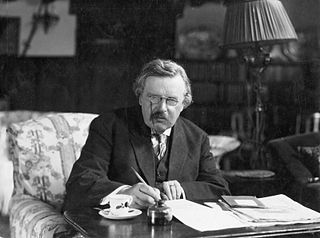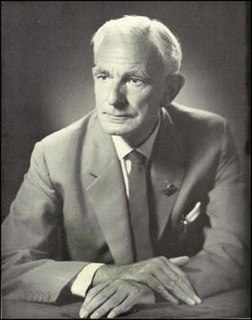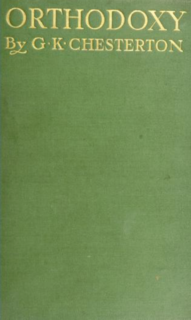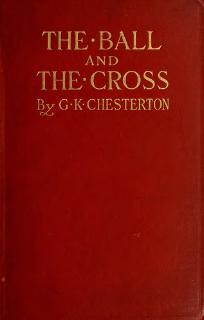Distributism is an economic theory asserting that the world's productive assets should be widely owned rather than concentrated.

Gilbert Keith Chesterton KC*SG was an English writer, philosopher, lay theologian, and literary and art critic. He has been referred to as the "prince of paradox". Time magazine observed of his writing style: "Whenever possible Chesterton made his points with popular sayings, proverbs, allegories—first carefully turning them inside out."
The ballade is a form of medieval and Renaissance French poetry as well as the corresponding musical chanson form. It was one of the three formes fixes and one of the verse forms in France most commonly set to music between the late 13th and the 15th centuries.

Arthur Kenneth Chesterton MC was a British far-right journalist and political activist. From 1933 to 1938, he was a member of the British Union of Fascists (BUF). Disillusioned with Oswald Mosley, he parted ways with the BUF in 1938. Chesterton established the League of Empire Loyalists in 1954, merged with the British National Party in 1967 to become the National Front. He founded and edited the magazine Candour in 1954 as the successor of Truth, of which he had been co-editor.

The Man Who Was Thursday: A Nightmare is a novel by G. K. Chesterton, first published in 1908. The book is sometimes referred to as a metaphysical thriller. The novelist Kingsley Amis describes his reading of the novel thusly,
By 'thrilling' I mean not only doing what a first-rate action-writer like Ian Fleming or Dick Francis can do -- keep you in continual and almost painful suspense, put you in fear for the hero's survival -- but persuading you that something wonderful is afoot, that the events described have a mysterious and momentous significance you hardly dare guess at. ... The Man Who Was Thursday...remains the most thrilling book I have ever read. ... The plot concern concerns spying, terrorism, an anarchist plot and a secret New Detective Corps organized to overthrow it: so much is clear from almost the beginning. But even earlier... whatever mysteries lie ahead, they are going to reach further and deeper than the twists and turns of an adventure story. ... What we expect from fantasy or a nightmare is that it should develop in an illogical, unpredictable way or perhaps not actually develop at all. But the feeling of the reader of The Man Who Was Thursday...is of being pulled inexorably along an inevitable path. Even the bizarre scenes turn out to have a definite and intelligible purpose. ... In one way or another, then, the nightmare is a controlled nightmare, and so in its way believable. But the sense of mystery remains, heightened indeed by glimpses of the ordinary world, the backcloth against which the drama or melodrama or whatever we decide to call it takes place. Definition remains impossible: The Man Who Was Thursday is not quite a political bad dream, nor a metaphysical thriller, nor a cosmic joke in the form of a spy novel, but it has something of all three. What it has most of is a boy's adventure story...

Father Brown is a fictional Roman Catholic priest and amateur detective who is featured in 53 short stories published between 1910 and 1936 written by English novelist G. K. Chesterton. Father Brown solves mysteries and crimes using his intuition and keen understanding of human nature. Chesterton loosely based him on the Rt Rev. Msgr. John O'Connor (1870–1952), a parish priest in Bradford, who was involved in Chesterton's conversion to Catholicism in 1922.

Orthodoxy (1908) is a book by G. K. Chesterton that has become a classic of Christian apologetics. Chesterton considered this book a companion to his other work, Heretics, writing it expressly in response to G. S. Street's criticism of the earlier work, "that he was not going to bother about his theology until I had really stated mine". In the book's preface, Chesterton states the purpose is to "attempt an explanation, not of whether the Christian faith can be believed, but of how he personally has come to believe it." In it, Chesterton presents an original view of Christian religion. He sees it as the answer to natural human needs, the "answer to a riddle" in his own words, and not simply as an arbitrary truth received from somewhere outside the boundaries of human experience.
The Marconi scandal was a British political scandal that broke in mid-1912. Allegations were made that highly placed members of the Liberal government under the Prime Minister H. H. Asquith had profited by improper use of information about the Government's intentions with respect to the Marconi Company. They had known that the government was about to issue a lucrative contract to the British Marconi company for the Imperial Wireless Chain, and had bought shares in an American subsidiary.

Cecil Edward Chesterton was an English journalist and political commentator, known particularly for his role as editor of The New Witness from 1912 to 1916, and in relation to its coverage of the Marconi scandal.
This is a list of books written by G. K. Chesterton.

The Napoleon of Notting Hill is a novel written by G. K. Chesterton in 1904, set in a nearly unchanged London in 1984.
G. K.'s Weekly was a British publication founded in 1925 by seminal writer G. K. Chesterton, continuing until his death in 1936. Its articles typically discussed topical cultural, political, and socio-economic issues yet the publication also ran poems, cartoons, and other such material that piqued Chesterton's interest. It contained much of his journalistic work done in the latter part of his life, and extracts from it were published as the book The Outline of Sanity. Precursor publications existed by the names of The Eye-Witness and The New Witness, the former being a weekly newspaper started by Hilaire Belloc in 1911, the latter Belloc took over from Cecil Chesterton, Gilbert's brother, who died in World War I: and a revamped version of G. K.'s Weekly continued some years after Chesterton's death by the name of The Weekly Review.
"The Rolling English Road" is one of the best-known poems by G. K. Chesterton. It was first published under the title A Song of Temperance Reform in the New Witness in 1913. It was also included in the novel by Chesterton, The Flying Inn in 1914.
In 19th century romantic music, a piano ballad is a genre of solo piano pieces written in a balletic narrative style, often with lyrical elements interspersed. This type of work made its first appearance with Chopin's Ballade No. 1 in G minor, Op. 23 of 1831–35, closely followed by the ballad included in Clara Schumann's Soirées musicales Op. 6 published in the same year.

The Chesterton Review is the peer-reviewed academic journal of the G. K. Chesterton Institute for Faith & Culture. It was established in 1974 to promote an interest in all aspects of G. K. Chesterton's life, work, art, and ideas, including his Christian apologetics. The journal includes essays and articles written by Chesterton, and occasionally publishes special issues on particular topics. It also publishes special editions in Spanish, Portuguese, French, and Italian. The editor-in-chief is Ian Boyd. The journal is available in both print and electronic formats from the Philosophy Documentation Center.

Dale Ahlquist is an American author and advocate of the thought of G. K. Chesterton. Ahlquist is the president and co-founder of the American Chesterton Society and the publisher of its magazine, Gilbert. He is also the co-founder of Chesterton Academy, a Catholic high school in Minneapolis.
Chesterton Academy is a private, co-ed, Catholic secondary school in Hopkins, Minnesota, United States. It is located in the Roman Catholic Archdiocese of Saint Paul and Minneapolis.

The Ball and the Cross is a novel by G. K. Chesterton. The title refers to a more worldly and rationalist worldview, represented by a ball or sphere, and the cross representing Christianity. The first chapters of the book were serialized from 1905 to 1906 with the completed work published in 1909. The novel's beginning involves debates about rationalism and religion between a Professor Lucifer and a monk named Michael. A part of this section was quoted in Pope John Paul I's Illustrissimi letter to G. K. Chesterton. Much of the rest of the book concerns the dueling, figurative and somewhat more literal, of a Jacobite Catholic named Maclan and an atheist Socialist named Turnbull. Lynette Hunter has argued that the novel is more sympathetic to Maclan, but does indicate Maclan is also presented as in some ways too extreme. Turnbull, as well, is presented in a sympathetic light: both duelists are ready to fight for and die for their antagonistic opinions and, in doing so, develop a certain partnership that evolves into a friendship. The real antagonist is the world outside, which desperately tries to prevent from happening a duel over "mere religion".
Frances Chesterton, born Frances Alice Blogg was an English author of verse, songs and school drama. She was the wife of G. K. Chesterton and had a large role in his career as amanuensis and personal manager.










